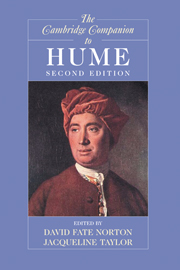Book contents
- Frontmatter
- 1 An Introduction to Hume’s Thought
- 2 Hume’s New Science of the Mind
- 3 Hume and the Mechanics of Mind: Impressions, Ideas, and Association
- 4 Hume’s Theory of Space and Time in Its Skeptical Context
- 5 Hume on Causation
- 6 Hume and the Problem of Personal Identity
- 7 Hume’s Skepticism
- 8 Hume’s Moral Psychology
- 9 The Foundations of Morality in Hume’s Treatise
- 10 Hume’s Later Moral Philosophy
- 11 The Structure of Hume’s Political Theory
- 12 Hume’s Principles of Political Economy
- 13 Hume on the Arts and “The Standard of Taste”: Texts and Contexts
- 14 David Hume: “The Historian”
- 15 Hume on Religion
- Appendix: Hume’s Autobiographies
- Selected Bibliography
- Index
- Series List
10 - Hume’s Later Moral Philosophy
Published online by Cambridge University Press: 28 May 2009
- Frontmatter
- 1 An Introduction to Hume’s Thought
- 2 Hume’s New Science of the Mind
- 3 Hume and the Mechanics of Mind: Impressions, Ideas, and Association
- 4 Hume’s Theory of Space and Time in Its Skeptical Context
- 5 Hume on Causation
- 6 Hume and the Problem of Personal Identity
- 7 Hume’s Skepticism
- 8 Hume’s Moral Psychology
- 9 The Foundations of Morality in Hume’s Treatise
- 10 Hume’s Later Moral Philosophy
- 11 The Structure of Hume’s Political Theory
- 12 Hume’s Principles of Political Economy
- 13 Hume on the Arts and “The Standard of Taste”: Texts and Contexts
- 14 David Hume: “The Historian”
- 15 Hume on Religion
- Appendix: Hume’s Autobiographies
- Selected Bibliography
- Index
- Series List
Summary
Hume writes in his autobiographical essay, “My Own Life,” that he regarded his Enquiry concerning the Principles of Morals as “of all my writings, historical, philosophical, or literary, incomparably the best.” This work, like the Enquiry concerning Human Understanding, was a part of his Treatise on Human Nature that he had decided to “cast anew” (MOL 9-10). In an advertisement composed late in his life, Hume wrote that the volume of essays that included these two works afforded him an opportunity to correct “some negligences in his former reasoning and more in the expression” of the Treatise, and that he wanted the later work, and not the Treatise, to be “regarded as containing his philosophical sentiments and principles.” The second Enquiry is often considered amore eloquent work than the Treatise. But Hume's correction of some “negligences” in reasoning, the addition of new arguments, and a restructuring of main themes give the later work a philosophical significance in its own right.
This essay examines Hume’s later moral philosophy. I also look at some differences between the Treatise and his later works. But the main aim of the essay is to draw attention to what makes the later work philosophically interesting and important in comparison with Hume’s earlier work. In particular, I show the importance of the mature Hume’s attention, in the second Enquiry, “A Dialogue,” and some of his essays, to the role of language and reason in morality. He also has important things to say about the issue of the universality and relativity of morals.
- Type
- Chapter
- Information
- The Cambridge Companion to Hume , pp. 311 - 340Publisher: Cambridge University PressPrint publication year: 2008
- 3
- Cited by



